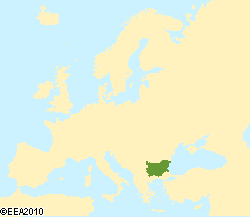Document Actions
Country profile - Drivers and impacts

In recent years, the growth in business and consumption has resulted in an increase in environmental pressure. The challenge is to break the link between economic growth and the consequent environmental impact.
In recent years, the growth in business and consumption has resulted in an increase in environmental pressure. The challenge is to break the link between economic growth and the consequent environmental impact caused by consumption, use of resources and waste generation.
Between 2000 and 2007 there was an overall drop in household waste generation from 518 kg per person to 469 kg. Moreover, the proportion of people served by organised waste collection systems rose from 78.6 % in 2000 to 92.5 % in 2007 (Source: ExEA - http://eea.government.bg/eng).
In 2007, the proportion of people connected to community wastewater treatment facilities offering at least secondary treatment was 33.8 %, or 0.4 % more than the previous year (Source: MoEW - http://www.moew.government.bg).
The share of renewable energy out of the total demand for domestic energy rose from 1.1 % in 1994 to 5.1 % in 2007. Figures for 2006 indicate that biomass was the predominant source (3.9 %), followed by hydroelectric power (1.8 %). Shares for wind, solar and geothermal energy were insignificant.
Although transport plays a basic role in public cohesion, it also has a serious impact on the environment. In 2007, motor transport was the dominant method for surface freight transportation (70 %) in Bulgaria, compared to 25.1 % for rail and 4.8 % for water transportation. Demand for energy in the transport sector has been increasing more quickly than GDP on an annual basis − by an average of 5.8 % between 1998 and 2006 (Source: NSI - http://www.nsi.bg).
Tourism is one of the most dynamic sectors of the national economy and plays a major role in Bulgaria's economic and social development. However, the encouragement of tourism combining benefits for the local and national economy with a rational use of natural resources remains a challenge. From 2000-2005, tourism experienced rapid privatisation which led to significant investment and growth (revenue increased by 65.4 % and tourism GDP by 43.5 %). However, the environment and the long-term development of tourism have been negatively affected by a number of factors, including overdevelopment along the Black Sea coast; inadequate spatial planning; poor infrastructure; amortisation of water supply networks; inadequate wastewater treatment; a shortage of waste collection/processing depots and low energy efficiency. Moreover, there has been insufficient focus on the use of alternative energy sources to date.
Bulgaria's forests (Source: SFA - www.dag.bg) are regarded by the public as part of the national heritage. They provide some 85 % of the country’s water drainage – approximately 3.6 billion m3 of pure drinking water – and are home to:
- over 80 % of Bulgaria’s protected plant varieties
- over 60 % of the animal species threatened with extinction
- over 60 % of the community types prioritised for preservation
- the populations of 43 species threatened with extinction on a world scale.
To retain this diversity, Bulgaria has three national parks, ten natural parks, 55 nature reserves and 35 maintained reserves. There are 332 Natura 2000 protected areas, covering 33.89 % of Bulgaria's land area (Source: MoEW - http://www.moew.government.bg).
Bulgaria's most dynamic economic sector is industry, which grew by 14 % in real terms during 2007 and 7.8 % in 2006. This development is stimulated both by external demand and by growing domestic demand, with sales of industrial goods rising rapidly on the home market - due to sales of industrial goods on the home market.
Agriculture is developing at variable rates. Its share in gross value added (GVA) fell from 13.9 % in 2000 to 6.2 % in 2007. It is presumed that this fall reflects the sector's low and variable growth rates which are outstripped by growth elsewhere in the economy. The ratio between gross value added and gross product (GVA/GP) is 40.7 % (Source: NSI - http://www.nsi.bg).




